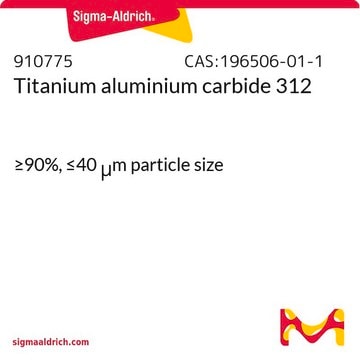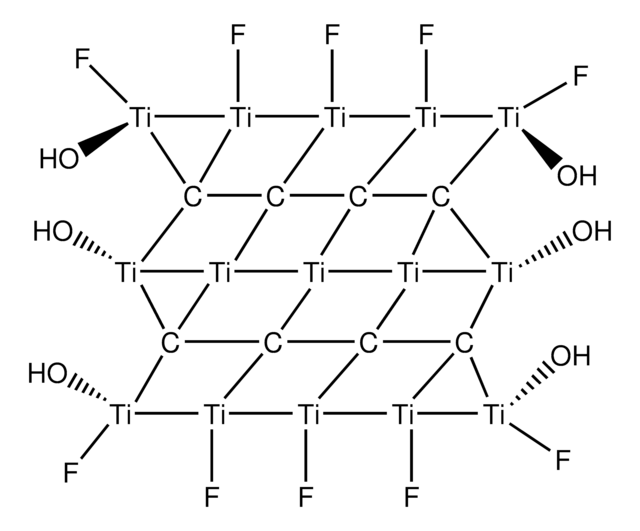636967
Titanium carbide
nanopowder, ≤200 nm particle size (SEM)
Synonym(s):
Titanium(IV) carbide
Sign Into View Organizational & Contract Pricing
All Photos(4)
About This Item
Linear Formula:
TiC
CAS Number:
Molecular Weight:
59.88
EC Number:
MDL number:
UNSPSC Code:
12352302
PubChem Substance ID:
NACRES:
NA.23
Recommended Products
form
nanopowder
particle size
≤200 nm (SEM)
bp
4820 °C (lit.)
mp
3140 °C (lit.)
density
4.930 g/mL at 25 °C (lit.)
bulk density
0.45 g/mL
SMILES string
[C-]#[Ti+]
InChI
1S/C.Ti/q-1;+1
InChI key
YXIVWSJCLXKLJL-UHFFFAOYSA-N
Looking for similar products? Visit Product Comparison Guide
Related Categories
Application
- Conductive two-dimensional titanium carbide ′clay′ with high volumetric capacitance: This study demonstrates the high volumetric capacitance of titanium carbide (Ti3C2) films, which are produced by etching aluminum from titanium aluminum carbide (M Ghidiu et al., 2014).
- Unique lead adsorption behavior of activated hydroxyl group in two-dimensional titanium carbide: The research highlights the lead adsorption capabilities of 2D titanium carbide due to activated hydroxyl groups (Q Peng et al., 2014).
- Transparent, flexible, and conductive 2D titanium carbide (MXene) films with high volumetric capacitance: This article describes the synthesis and properties of transparent and flexible 2D titanium carbide films, which exhibit high volumetric capacitance (C Zhang et al., 2017).
Storage Class Code
11 - Combustible Solids
WGK
WGK 1
Personal Protective Equipment
dust mask type N95 (US), Eyeshields, Gloves
Choose from one of the most recent versions:
Already Own This Product?
Find documentation for the products that you have recently purchased in the Document Library.
Customers Also Viewed
J Rohrer et al.
Journal of physics. Condensed matter : an Institute of Physics journal, 22(1), 015004-015004 (2010-01-13)
We present a strategy to identify energetically favourable oxide structures in thin-film geometries. Thin-film candidate configurations are constructed from a pool of sublattices of stable and metastable oxide bulk phases. Favourable stoichiometric compositions and atomic geometries are identified by comparing
Marina Brama et al.
Biomaterials, 28(4), 595-608 (2006-10-20)
Titanium has limitations in its clinical performance in dental and orthopaedic applications. This study describes a coating process using pulsed laser deposition (PLD) technology to produce surfaces of titanium carbide (TiC) on titanium substrates and evaluates the biological response both
Raimo Silvennoinen et al.
Optics express, 16(14), 10130-10140 (2008-07-09)
Adsorption of human plasma fibrinogen (HPF) on 6 differently treated titanium samples (polished, polished and etched, and 4 titanium carbide coatings samples produced by using plasma-enhanced chemical vapour deposition (PECVD) method) is investigated by using diffractive optical element (DOE) sensor.
Woo Sik Kim et al.
Nanotechnology, 21(5), 055608-055608 (2010-01-07)
Single-phase layered titanium carbide (TiC) was successfully synthesized by reacting carbon nanotubes (CNTs) and titanium dioxide (TiO2) under a high direct current (DC) pulse. Single-phase TiC layer fabrication is confirmed as the transformation of multi-layered graphene from MWCNTs. Therefore its
Hiroshi Moriwaki et al.
Journal of hazardous materials, 185(2-3), 725-731 (2010-10-26)
The aim of this study is to investigate the utilization of the powder of porous titanium carbide (TiC) ceramics as a novel adsorbent or a material for solid-phase extraction (SPE). The adsorption and elution of inorganic and organic pollutants, Pb(II)
Articles
Among various ceramics, one-dimensional (1-D) piezoelectric ceramics have attracted significant scientific attention for use in energy harvesting.
Our team of scientists has experience in all areas of research including Life Science, Material Science, Chemical Synthesis, Chromatography, Analytical and many others.
Contact Technical Service













